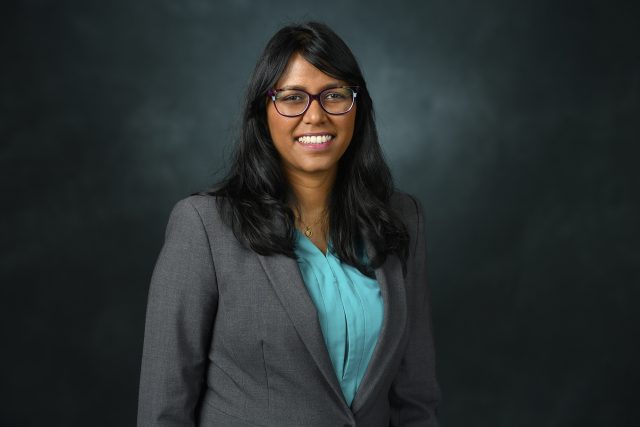
Nadeeja Wijayatunga, an assistant professor in the UM Department of Nutrition and Hospitality Management, recently published a paper titled ‘Normal weight obesity and unaddressed cardiometabolic health risk – a narrative review’ in the International Journal of Obesity, one of the Springer Nature journals. Photo by Thomas Graning/Ole Miss Digital Imaging Services
OXFORD, Miss. – Sometimes, a normal weight is not as healthy as it seems, and the truth about an overall picture of health may surprise many individuals and even medical professionals. But research conducted by a University of Mississippi professor is helping shed light on a condition known as normal weight obesity.
Nadeeja Wijayatunga, an assistant professor in the UM Department of Nutrition and Hospitality Management, recently published a paper titled “Normal weight obesity and unaddressed cardiometabolic health risk – a narrative review” in the International Journal of Obesity, one of the Springer Nature journals.
The Mayo Clinic defines normal weight obesity, or NWO, as having a normal weight when the body fat percentage is high enough to be classified as obese. This is commonly known as “skinny fat.” Obesity is defined as having an excessive amount of body fat – not as weighing too much.
Normal weight obesity means an individual may have the same serious health risks as a person who is classically obese.
“About 30 million Americans are estimated to have NWO, but most of them and their health care providers are unaware of the increased health risks,” Wijayatunga said. “This is because these individuals are classified as ‘normal weight’ and assumed to be healthy, based on their normal BMI during routine health screening.
“Another harmful effect of being labeled as ‘normal weight’ is that it may give a false sense of assurance.”
Besides having excess body fat, people with NWO may have a high waist circumference, indicating unhealthy fat deposition in the abdomen area, less muscle mass, poor muscle strength and poor fitness. People with NWO are more likely to develop cardiovascular diseases and diabetes because they have more inflammation compared to healthy lean individuals.
The concern with NWO is that there could unhealthy changes or cardiovascular disease conditions that may not be obvious and go undetected by routine health screenings.
NWO is an understudied area of research and many gaps remain to be filled, Wijayatunga said. Based on existing literature, there seem to be some genetic associations with NWO. Few patterns of unhealthy diet, physical inactivity and sedentariness were reported to be associated with NWO compared to normal body fat amounts, but the findings are inconclusive and more research is needed.
The author recommends the introduction of body fat measurement during routine health screenings to avoid misclassifying individuals with health risk due to high body fat. She said a standard definition for body fat cutoff is needed because many different body fat cutoff values have been used in the past.
Trained as a medical doctor and nutrition scientist, Wijayatunga is director of the Nutrition and Obesity Research Lab in the Department of Nutrition and Hospitality Management. Her main research interests include biobehavioral aspects of obesity and unhealthy lean, and nutrition education-related research in the areas of weight bias and ageism.
After obtaining her Ph.D. in nutritional sciences at Texas Tech University, she completed a two-year postdoctoral training in the Texas Tech Department of Kinesiology and Sport Management. During that time, she was awarded the American Heart Postdoctoral fellowship to study NWO.
Wijayatunga completed her master’s degree in clinical biochemistry at the University of Sri Jayewardenepura, and her medical degree from the Univerisity of Peradeniya in Sri Lanka. Before coming to the U.S., she worked as a faculty member in the Department of Biochemistry, part of the medical school at the University of Sri Jayewardenepura in Sri Lanka.
She is also vice chair of the Early Career Nutrition Interest group of the American Society for Nutrition.
“I got interested in studying unhealthy lean because I have seen unhealthy patients with a normal weight when I was working as a physician,” Wijayatunga said. “This is the beginning of my research on unhealthy lean, and I’m looking forward to expanding more in this area.”
Melinda Valliant, chair of the Department of Nutrition and Hospitality Management, lauded Wijayatunga for mentoring students in the department and for her research efforts.
“Her research regarding NWO provides opportunities for further investigations,” Valliant said. “In addition, this research highlights the need for body composition assessment as part of routine health care management, something that registered dietitians are trained to conduct and interpret.”
For more information about NWO research at Ole Miss, email nadeejaw@olemiss.edu.